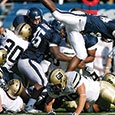I spent two years as the sole band director at Windthorst ISD, a small independent school district in North Texas with a well-earned reputation of excellence in sports. As you enter the the town limits you are greeted by a sign that says “Home of Champions” and the sentiment is backed up by eighteen state championships in four sports. All teams consistently progress deep into the playoffs.
With a high school population under 200 students, the band program relies on sharing students with not just sports but also agriculture, 4H, academic pursuits, and religion classes. Eighth graders were used in marching band, which created an interesting rehearsal schedule. Each teacher in the district understands that every activity shares students, and this practice was explicitly outlined in my interview for the position. Sports always received first priority, but it can be argued that through a history of successes they have rightfully earned that place.
Windthorst Athletic Director Chris Tackett was kind enough to answer some questions about his experience working with band directors to give some insight from a coach’s perspective.
.jpg)
How many band directors have you worked with over your teaching career?
Six or so.
As a coach, can you point to any specific actions taken by band directors to best assist coaches and student athletes?
Asking about workouts and working together to coordinate practices. Making everyone aware far ahead of time of special events.
What do you expect from band directors?
Work together; we both have jobs to do. Toughen up. More times than not the students are going to pick something other than what you want. Know when to play during the game. The band is great, but sometimes you play so loudly that we cannot do our job.
What should band directors avoid?
Do not go straight to the administration when there is conflict. Do not make students choose between one or the other. Do not expect the coaches to mark your practice field.
What advice would you give band directors looking to have strong relationships between coaches and athletic directors?
Open dialogue. Do not lock yourself in the band hall; get out and have fun with the staff. See if there is a particular theme for the season and see if there is music that goes with it. Beer is never a bad icebreaker.
What to Do
One of the first things I try to do in preparation for each year is gather the calendars from the various sports (this is especially necessary in the fall) and compare them with the band calendar. Ideally, the review of the calendars takes place in April or early May. I have additional people also compare the band calendar to other calendars. Once before the school year started, the UIL academic coach, a former band parent and booster club member, spotted that our concert festival date was in conflict with a One Act Play competition. Because of this early catch we were able to adjust the calendar and alert other schools in our district about the conflict.
In a small community specific dates and times for band practice may already be set and unless you have major grounds for changing things, it is best to leave it as it is. While it may be strange to have band rehearsal on Wednesday night anywhere else in the country, it is tradition in this town. Because of the schedule of sports practices and games there is no other available time. The community knows exactly when band practice will be and it could cause a major debacle to try to move it to a different day or time.
Communication is key. As long as all of the coaches, extracurricular teachers, and band directors are in communication many conflicts can be avoided without affecting any programs or students. Students have many choices in small towns, and each activity will suffer if students do not have the opportunity to participate in multiple areas.
Be flexible. Know ahead of time how students are shared at halftime and work with it. Sometimes football players are able to participate in halftime performances, and sometimes they can only do so on special occasions.
Communication with the cheer sponsor is just as important as with the football coaches to help Friday nights run smoothly. Because halftime is a break for the cheerleaders, by marching at halftime those girls don’t get a break during the game. As a new band director, I completely forgot the ladies wouldn’t get a chance to relax and for a few games didn’t understand why they would hand their instruments off to other students and run almost immediately after the halftime performance. Finally I asked one of my drum majors, who was also a cheerleader, why they were running off. She told me it was the only time they had to eat. After that I never thought twice about those girls running off immediately after their performance.
Minimize interruptions to practices. I have found success in asking for students to miss a practice only when it is absolutely necessary. We have a marching festival each year on the first Monday of October, and it is held at the same stadium as the district marching competition, so it is a perfect opportunity for the band to have a critiqued performance someplace they will play again later in the season. Once I confirmed we were definitely attending, I requested a later performance time so the student athletes had the most possible time at practice. In the past, I have been able to arrange it so the football players only missed ten minutes of practice and were able to ride the bus with the band. The eighth-grade volleyball girls had a game, but I arranged with parents attending the game to bring the girls directly to the performance, and other band members made sure their uniforms and instruments made it onto the bus and trailer. I am sure it helps the band relationship with the coaches that we only ask students to miss part of one practice in the fall.
From the beginning of the school year stress the importance of your students communicating their schedules to you. Many students involved with showing animals may attend events outside of the school schedule, and when you gather schedules you may not know about stock shows or agriculture judging events. One Friday night a few years ago I received a Facebook message from a parent letting me know my tuba player needed to leave at halftime to head to Dallas because he was showing his heifer at the state fair the next day. He was excused and I understood, but I had no idea that student had a heifer, much less one that had advanced to the state fair.
The earlier in the school year you can get the band schedule to students, the less likely you are to have last-minute conflicts pop up. It was not the agriculture teacher’s responsibility to coordinate that event with me given that the student was traveling with his family. However, he was representing the school and the agriculture department, so even though our low brass section thinned out after he left, it was perfectly fine.
Remember the small sports. Each spring I was a little thrown off by golf and tennis. Neither golf nor tennis are particularly large team sports, but the school always sent representatives for each to district games. In a small school with a band pushing fifty members, it is likely someone on the golf or tennis teams will also be in band. This is easily worked around by emphasizing the need for students to communicate with you and seek out the coaches who oversee those sports and ask them to keep you in the loop on who they will be sending to district games. The past two years golf and tennis district games have occurred on the same dates as concert festival, and so I made a plan with the coaches to hand off students should we need to share personnel on that day.
Take the time to get to know the coaches and sponsors of other activities in your school. I found that eating lunch with the other teachers in my building built good relationships and made it easier to work out scheduling when a conflict arose. Remember that you are all there because you want students to experience success and grow into productive members of society.
All band directors should develop some public relations skills. Your support of your students participating in multiple activities will build positive rapport not only with the students but also the community. Particularly in small towns, students and community members need to feel your support for all of their activities, or you will end up losing support and your program will suffer. Always speak well of coaches and other activities when talking to students, parents, or community members, and while you may not want to be shuttling the band to football games in December, never let it show. Play some seasonal tunes at halftime and cheer until the season ends.






